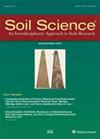土壤有机碳荟萃分析质量评价
4区 农林科学
Q2 Agricultural and Biological Sciences
引用次数: 5
摘要
摘要土壤有机碳(SOC)在全球碳循环中起着至关重要的作用,是二氧化碳的潜在汇。农业管理实践可以支持碳固存,因此可以提供潜在的去除策略,同时还可以改善整体土壤质量。荟萃分析允许人们通过计算总体效应大小来总结主要文章的结果,并揭示研究间差异的来源。农业领域发表的荟萃分析的数量在不断增加。与此同时,越来越多的文章将他们的综合工作称为荟萃分析,尽管使用的方法并不严格。因此,发表的低质量的荟萃分析可能会导致科学家、政策制定者和农民得出可疑的结论和建议。本研究旨在定量分析2005年至2020年间发表的31项荟萃分析,研究不同管理实践对SOC的影响。我们通过调整来自不同学科的现有元分析指南,编制了一套适合土壤和农业科学的质量标准。该集合由允许定量分析的评分方案支持。检索到的荟萃分析根据11个管理类别进行结构化,例如耕作,覆盖作物,作物残留物管理和生物炭应用,这使我们能够评估这些类别的知识状况。主要缺陷是在使用标准度量来计算效应量、效应量的独立性、每项研究的标准差提取以及方差逆加权等方面。在31项研究免耕/免耕与常规耕作效果的有机碳荟萃分析中,只有1项发现质量高。因此,迫切需要改进有机农业、生物炭、施肥或作物多样化对有机碳影响的meta分析。我们得出的结论是,尽管过去15年做出了努力,但SOC研究的元分析质量仍然很低。因此,为了使科学界能够提供高质量的综合工作,并在农业土壤的可持续管理方面取得进展,我们需要尽快适应严格的元分析方法。本文章由计算机程序翻译,如有差异,请以英文原文为准。
Quality assessment of meta-analyses on soil organic carbon
Abstract. Soil organic carbon (SOC) plays a vital role in the
global carbon cycle and is a potential sink for carbon dioxide. Agricultural
management practices can support carbon sequestration and, therefore, offer
potential removal strategies whilst also improving overall soil quality.
Meta-analysis allows one to summarize results from primary articles by
calculating an overall effect size and to reveal the source of variation
across studies. The number of meta-analyses published in the field of
agriculture is continuously rising. At the same time, more and more articles
refer to their synthesis work as a meta-analysis, despite applying less than
rigorous methodologies. As a result, poor-quality meta-analyses are
published and may lead to questionable conclusions and recommendations to
scientists, policymakers, and farmers. This study aims at quantitatively analyzing 31 meta-analyses, published
between the years of 2005 and 2020, studying the effects of different management
practices on SOC. We compiled a set of quality criteria suitable for soil and
agricultural sciences by adapting existing meta-analytical guidelines from
other disciplines. The set is supported by a scoring scheme that allows for a
quantitative analysis. The retrieved meta-analyses were structured according
to 11 management categories, such as tillage, cover crops, crop residue
management, and biochar application, which allowed us to assess the
state of knowledge on these categories. Major deficiencies were found in the
use of standard metrics for effect size calculation, independence of effect
sizes, standard deviation extraction for each study, and study weighting by
the inverse of variance. Only 1 out of 31 SOC meta-analyses, which studied
the effects of no tillage/reduced tillage compared with conventional tillage, was
found to be of high quality. Therefore, improved meta-analyses on the
effects of organic agriculture, biochar, fertilization, or crop
diversification on SOC are urgently needed. We conclude that, despite efforts over the last 15 years, the quality of
meta-analyses on SOC research is still low. Thus, in order for the scientific
community to provide high-quality synthesis work and to make advancements in
the sustainable management of agricultural soils, we need to adapt rigorous
methodologies of meta-analysis as quickly as possible.
求助全文
通过发布文献求助,成功后即可免费获取论文全文。
去求助
来源期刊

Soil Science
农林科学-土壤科学
CiteScore
2.70
自引率
0.00%
发文量
0
审稿时长
4.4 months
期刊介绍:
Cessation.Soil Science satisfies the professional needs of all scientists and laboratory personnel involved in soil and plant research by publishing primary research reports and critical reviews of basic and applied soil science, especially as it relates to soil and plant studies and general environmental soil science.
Each month, Soil Science presents authoritative research articles from an impressive array of discipline: soil chemistry and biochemistry, physics, fertility and nutrition, soil genesis and morphology, soil microbiology and mineralogy. Of immediate relevance to soil scientists-both industrial and academic-this unique publication also has long-range value for agronomists and environmental scientists.
 求助内容:
求助内容: 应助结果提醒方式:
应助结果提醒方式:


